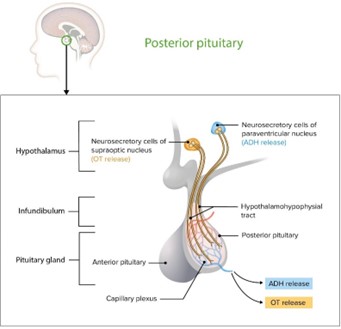Which finding indicates to the nurse that demeclocycline is effective for a patient with a syndrome of inappropriate antidiuretic hormone (SIADH)?
Urine-specific gravity is increased.
Patient's weight is increased.
Peripheral edema is decreased.
Patient’s urinary output is increased.
The Correct Answer is D
Demeclocycline is a tetracycline antibiotic that can be used to treat SIADH, a condition characterized by excessive water retention and a decrease in urinary output. Demeclocycline blocks the action of antidiuretic hormone (ADH), which can help increase urinary output and decrease water retention in patients with SIADH. Therefore, an increase in urinary output would indicate that demeclocycline is effective in treating the patient's SIADH. Options a, b, and c are incorrect because they do not directly relate to the mechanism of action of demeclocycline in treating SIADH.

Nursing Test Bank
Naxlex Comprehensive Predictor Exams
Related Questions
Correct Answer is D
Explanation
Therefore, the correct option is d. Glyburide is a sulfonylurea medication used to treat type 2 diabetes. It works by stimulating the beta cells in the pancreas to produce and release more insulin, which helps to lower blood glucose levels.
Option A is incorrect because glyburide does not affect glucagon secretion from the pancreas. Glucagon is a hormone that raises blood glucose levels by promoting the breakdown of glycogen in the liver.
Option b is incorrect because glyburide should not be taken if the morning blood glucose level is less than 70 mg/dL, as this may increase the risk of hypoglycemia.
Option c is incorrect because glyburide does not interact with IV contrast media. However, some types of IV contrast media can cause kidney damage in patients with diabetes, and the use of glyburide should be temporarily discontinued if a patient is undergoing a procedure that involves the use of contrast media.
Correct Answer is B
Explanation
The correct action for the nurse to take first when preparing to teach a newly diagnosed 43-year-old man with type 2 diabetes home management of the disease is to assess the patient's perception of what it means to have diabetes. This will help the nurse to identify any misconceptions or fears the patient may have about the condition, and tailor the education to meet the patient's specific needs. Options A, C, and D are important components of diabetes education but can be addressed after the nurse has assessed the patient's perception of the disease.
Whether you are a student looking to ace your exams or a practicing nurse seeking to enhance your expertise , our nursing education contents will empower you with the confidence and competence to make a difference in the lives of patients and become a respected leader in the healthcare field.
Visit Naxlex, invest in your future and unlock endless possibilities with our unparalleled nursing education contents today
Report Wrong Answer on the Current Question
Do you disagree with the answer? If yes, what is your expected answer? Explain.
Kindly be descriptive with the issue you are facing.
